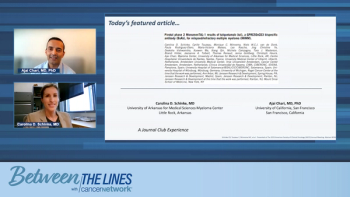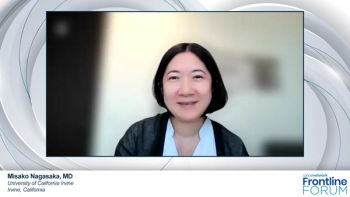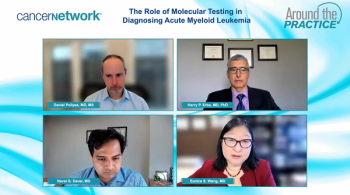
Expert hematologist-oncologists identify long-term data from MonumenTAL-1 regarding infection rates in patients with relapsed/refractory multiple myeloma.

Your AI-Trained Oncology Knowledge Connection!


Expert hematologist-oncologists identify long-term data from MonumenTAL-1 regarding infection rates in patients with relapsed/refractory multiple myeloma.

Following their review of data from MonumenTAL-1, Ajai Chari, MD, and Carolina Schinke, MD, share practical considerations for real-world use of talquetamab in relapsed/refractory multiple myeloma.

Brian Rini, MD, reviews data from the 5-year analysis of the KEYNOTE-426 trial in advanced clear cell renal cell carcinoma.

Robert Motzer, MD, presents the overall survival analysis data from the 4-year follow-up of the CLEAR study in patients with advanced renal cell carcinoma.

Drs. Koprivnikar, McCloskey, and Cho delve into the diagnostic process in acute myeloid leukemia (AML), treatment approaches for AML, and factors influencing treatment selection.

A closer look at the current unmet needs in MPN treatment, ongoing trials, and recent updates such as the MOMENTUM and FREEDOM trials.

Shared insight on the standard work-up and staging practices used when a patient presents with newly diagnosed bladder cancer.

Expert panelists review a patient presentation of bladder cancer and consider the typical signs and symptoms that may lead to a diagnosis.

Focused discussion on how patients receiving bispecific therapy for multiple myeloma are transitioned into and managed within the community setting.

Expert panelists share insight on transitioning patients on bispecific therapy from an academic or specialty center to the community setting.

Dr. Daver anticipates how the MDS landscape will evolve over time, emphasizing the importance of adopting targeted therapies.

Subject-matter expert provides an overview of the CD47 pathway and shares how emergent trial data are impacting the MDS treatment landscape.

Catherine Wei, MD, and David Witt, MD, explain some of the reasons they would recommend treatment with bispecific antibodies to their patients with multiple myeloma.

Shared insight on uncommon EGFR mutations in patients with non–small cell lung cancer and how they fit into the larger disease paradigm.

Syed S. Ali, MD, and Noffar Bar, MD, share their practical experience with bispecific antibodies in the treatment of patients with multiple myeloma.


Trastuzumab deruxtecan appears to elicit ‘impressive’ responses among patients with HER2-positive gynecologic cancers regardless of immunohistochemistry in the phase 2 DESTINY-PanTumor02 trial.

Experts on multiple myeloma discuss how to select treatment options in later lines of therapy.

Leyla O. Shune, MD, reviews the MAIA trial, which looked at DRd vs Rd in patients with transplant-ineligible multiple myeloma.

The expert panel presents the case of a patient with multiple myeloma and discusses evaluating transplant eligibility in patients with MM.

The expert panel discusses how MRD positivity affects treatment decisions for patients with colorectal cancer.

Experts on colorectal cancer present a patient case, offer their initial impressions, and discuss disease staging.

Before closing out their module on relapsed/refractory multiple myeloma, key opinion leaders reflect on the role of CAR T-cell therapy and patient access to care.

A panel of experts discuss unmet needs in multiple myeloma and offer perspectives on the future treatment landscape.

Centering discussion on bispecific therapy, panelists consider dosing strategies and adverse event management in relapsed/refractory multiple myeloma.

An expert panel compares bispecific antibodies with CAR T-cell therapy and discusses treatment sequencing.

Ritu Salani, MD, highlights the possible benefit of a novel targeted therapy and autologous tumor vaccine in patients with platinum-resistant ovarian cancer, and in the maintenance setting after treatment for platinum-sensitive disease.

Daniel Pollyea, MD, MS, discusses how he assesses patients with newly diagnosed acute myeloid leukemia for the best first-line therapy, including the role of intensive induction chemotherapy.

Eunice S. Wang, MD, offers an overview of common barriers to performing molecular testing in community practices, including uncertainty about which tests to perform and the wait times for results.

Focused discussion on the safety and efficacy data from MonumenTAL-1, which utilized talquetamab monotherapy in patients with relapsed/refractory multiple myeloma.